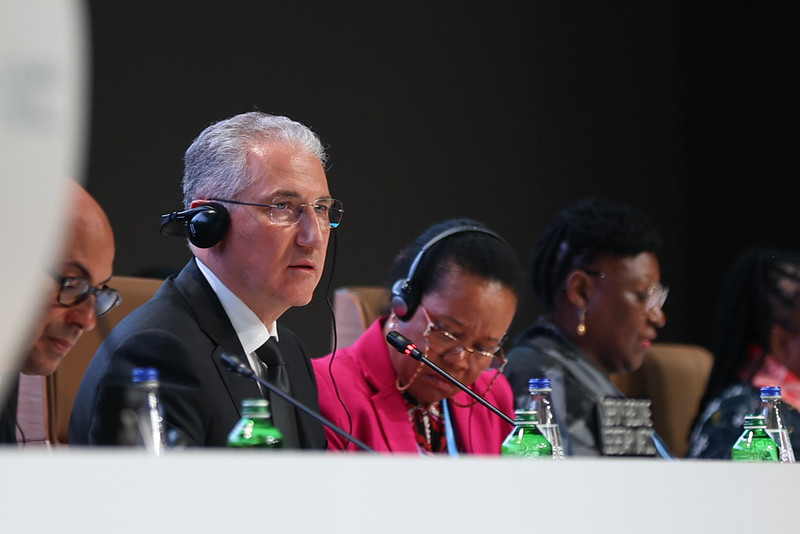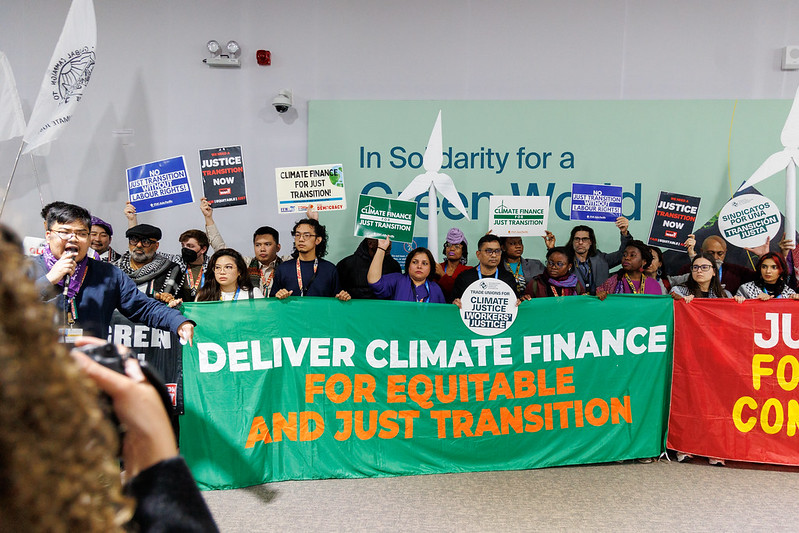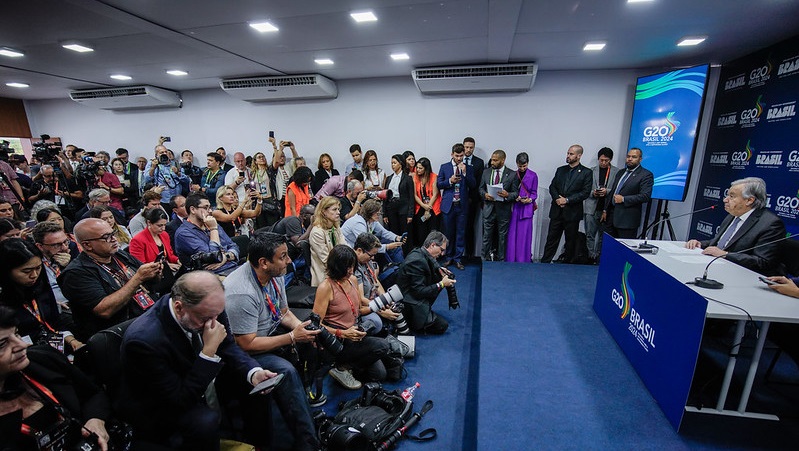This article will be updated throughout the day and an edited version will be sent out each evening as a newsletter – you can sign up here.
Baku talks divided on fossil fuel transition
Late on Saturday, when many COP29 delegates were letting their hair down after a long week, negotiators rowed openly over whether discussions on emissions-cutting should continue into the next week or be postponed.
A coalition of developed countries, small islands, the least developed countries and some Latin American nations support using a channel of the talks called the Mitigation Work Programme to take forward last year’s global commitment to transition away from fossil fuels.
They had pushed to set up an emissions-cutting “ facilitation process and platform” and “urge” governments to do things like stop building new coal-fired power plants and phase out (not just, as previously agreed, phase down) coal.
They wanted to set numerical targets for reducing methane emissions, curbing deforestation, increasing energy storage and improving grids to enable the roll-out of renewable energy.
But, speaking in Saturday night’s plenary, Saudi Arabia said this was an attempt at “eroding the flexibility developing countries depend on” and that there should be no new targets or goals.
Bolivia, speaking on behalf of the LMDC group which includes China, also rejected “targets and outlandish proposals”. Iran and India supported this, with India saying that the talks’ conclusions were supposed to be “non prescriptive”. The African group also rejected “attempts to impose new requirements”.
With governments divided over the very purpose of the talks, co-chairs suggested on Saturday not continuing them into the second week and delaying them for six months until the mid-year climate talks in the German city of Bonn – scrapping all the work done in week one. Sources in the room told Climate Home that Saudi Arabia raised this option.
Then, on Monday, COP29 President Mukhtar Babayev said he would make efforts to avoid this happening, adding “COP29 cannot be silent on mitigation” and that he would “address the matter in every direction” available.
At Monday’s plenary, several countries expressed disappointment with the state of the mitigation talks but rejected postponing them to next year, many of them saying this would be a priority.
Australia, on behalf of the Umbrella Group of developed countries, said “some parties consistently blocked” progress and welcomed the presidency’s efforts to keep the talks going. The EU also said this would be a priority.
The AOSIS group of small islands said they would not leave Baku without “a strong mitigation outcome”. “The fact that those discussions are stalled is extremely concerning for our group,” the negotiator from Samoa told the COP plenary.
Switzerland also noted that decisions made in Baku on mitigation will serve to inform the next round of nationally determined contributions (NDCs), which is due next year. “It’s not acceptable that in the very body meant to reduce emissions we do not have a clear message going forward,” the Swiss negotiator said.
The COP president said his team will run consultations with countries, which will be facilitated by Norway and South Africa and will conclude by Wednesday. He also ruled out the possibility of a cover text, which is a high-profile general statement signed off by all governments but not linked to any particular strand of the negotiations.

COP29 President Mukhtar Babayev (left) speaks at a plenary session at the UN climate conference in Baku, Azerbaijan, on November 18, 2024. (Photo: UN Climate Change – Kiara Worth)
Andreas Sieber, associate director of policy and campaigns at 350.org, said Saudi Arabia wants to be as “unconstructive as they can be when it comes to fossil fuels” and is “happy to be destructive”. He added that civil society “disagrees” with this because there is a need to talk about implementing last year’s decisions on energy transition as well as finance for that implementation.
The European Union waded into the debate on Monday afternoon, with its climate commissioner Hoekstra saying it was “imperative” to send a strong signal from Baku to inform the next round of national plans for cutting emissions (NDCs). “We must follow on our historic decision in Dubai to truly transition away from fossil fuels,” he added.
He praised the announcements of 2035 emissions reduction goals from the UAE, Brazil and the UK before and during COP29 as “positive and promising”.
He added that the EU would put together an ambitious NDC in line with the 1.5C warming limit – and is on the right track, cutting greenhouse gas emissions by more than 8% in 2023. “We need – and we will continue to keep the pace,” he said, without clarifying when the EU’s updated NDC would land.
New UN carbon market standards are a step change in protecting people and planet
Presidency gets help
At Monday’s plenary, the COP presidency announced the usual ministerial pairs that will facilitate discussions on the most contentious issues, including finance, mitigation and the UAE Dialogue on last year’s Global Stocktake.
Among the ministerial task forces, COP29 president Mukhtar Babayev announced that the UK and Brazil will “support and advise” the presidency to “ensure we deliver a high-ambition balanced package” in Baku. Brazil will hold the COP’s presidency next year while the UK is the last developed country to have held it in 2021.
“People have told me that they are concerned about the state of negotiations. Let me be clear: I’m also concerned that the parties are not moving towards each other quickly enough. It’s time for them to move faster,” Babayev told a press conference on the sidelines of COP29.
Azerbaijan has never had a major role in climate talks so – unlike the UK and Brazil – does not have many experienced negotiators. Its lead negotiator Yalchin Rafiyev is a relative newcomer to climate talks in his 30s.
The UAE last year got around its lack of capacity by hiring negotiators who had worked for previous presidencies as consultants, but Azerbaijan has not done the same. Leaning on the Brits and Brazilians looks like their last-minute solution.
UN climate chief Simon Stiell also called out parties for the slow progress, calling on parties to break “individual silos”. “ We cannot afford any outbreak of ‘you-first-ism’, where groups of parties dig in and refuse to move on one issue until others move elsewhere. This is a recipe for going literally nowhere.”
Time is ticking and Stiell called on negotiators to finish technical work early to have time to sort out the most contentious topics. Babayev said consultations will be carried out until Wednesday, when he hopes to land a new draft text on the climate finance goal.
G20 finance breakthrough?
As the UN Secretary-General Antonio Guterres touched down in Rio de Janeiro for the G20 leaders meeting last night, his mind was back in Azerbaijan. “I am concerned about the state of the negotiations at COP29 in Baku,” he told a Brazilian press conference.
He’s right to be. Progress on the post-2025 New Collective Quantified Goal (NCQG) for finance has been slow and the ministers arriving today have a lot of work to do.
But a Reuters report boosted hopes for a breakthrough, saying that negotiators of the G20 communique “agreed to a text mentioning developing nations’ voluntary contributions to climate finance, stopping short of calling them obligations, according to two diplomats”.

Activists demand finance for a fair energy transition at the COP29 climate talks in Baku, Azerbaijan on November 18, 2024. (Photo: UN Climate Change – Habib Samadov)
If that’s agreed by world leaders in Brazil, climate ministers in Baku won’t go against it. That could unlock bigger numbers for the NCQG, as developed countries say adding new country contributors is a condition of raising their climate finance promise above $100 billion a year.
The European Union’s climate action commissioner, Wopke Hoekstra, sent a positive signal in Baku, saying that the EU would be open to developing countries that have become more affluent making voluntary finance contributions, without having to change their official economic categorisation.
“In the end, this is not about dogmatism – this is about solving one of the largest problems that humanity is facing in this period of time,” he told a press conference, adding that the key objective is to get more funding to the vulnerable nations that are struggling most with climate impacts.
He noted, however, that even expanded public finance from governments would not be enough to meet the needs and that money from the private sector would also be required.
“It is crystal clear that we need to broaden the solutions space,” Hoekstra said.
Attila Steiner, Hungary’s State Secretary for Energy and Climate Policy and its representative to the EU Council, added that the new UN carbon market – whose rules are still being decided – also had clear potential to generate larger streams of climate finance.
In brief…
Ambitious but not credible – Climate Action Tracker’s analysis of the UAE’s new climate plan says that its new 2035 target is 1.5C-aligned. But its 2030 target, which has not been updated, is not – and the UAE is predicted to miss even this unambitious goal due to an “unrealistic reliance” on carbon capture. The plan then aims for emissions to drop by a whopping 40% between 2030 and 2035, which makes the more ambitious 2035 target “not credible”, the tracker said.
Freudian slip – Asked by the Irish Daily Mirror if signing oil and gas deals shows climate leadership, COP29 President Mukhtar Babayev said that “petrostates… I mean, oil and gas-producing countries, fossil fuel-producing countries” have a chance to demonstrate leadership by investing in green transition projects. Azerbaijan’s President Ilham Aliyev railed last week against being labelled a petrostate.
Biden in the Amazon – On a visit to the Brazilian city of Manaus, Joe Biden announced various initiatives to fund the protection and restoration of the Amazon rainforest, among them a $10-billion pool of public and private funds and $50 million for the Amazon Fund, bringing total U.S. contributions to the Amazon Fund to $100 million, subject to Congressional notification. He said he was the first sitting president to visit the Amazon. “Let’s preserve this sacred place, for our time and forever, for the benefit of all humanity”, he ended.
Green industry boost – Germany, UK and the Climate Investment Funds (CIF) have announced a new pledge of $1.3 billion for green industries in the Global South. Canada is set to contribute additional funds. The group of developed countries said they hoped to send a “clear signal” of commitment to climate finance while bringing private donors on board. The CIF will provide $900 million of the funding from the coalition.
